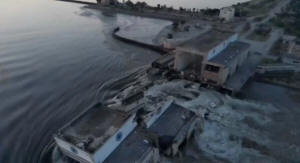Dam destroyed in Ukraine, flooding war zone
 Send a link to a friend
Send a link to a friend
 [June 06, 2023]
By Viktoriia Lakezina [June 06, 2023]
By Viktoriia Lakezina
KHERSON, Ukraine (Reuters) -A torrent of water burst through a huge dam
on the Dnipro River that separates Russian and Ukrainian forces in
southern Ukraine on Tuesday, flooding a swathe of the war zone and
forcing villagers to flee.
Ukraine and its Western allies accused Russia of blowing up the dam in a
deliberate war crime. The Kremlin said it was Ukraine that had sabotaged
the dam, to distract attention from a counteroffensive Moscow claims is
faltering. Some Russian-installed officials said the dam had burst on
its own.
Neither side offered immediate public evidence of who was to blame. The
Geneva Conventions explicitly ban targeting dams in war, because of the
danger to civilians posed by destruction of such "works and
installations containing dangerous forces".
By mid-morning in the city of Kherson on the Ukrainian-held side, a pier
on a tributary of the Dnipro had already been submerged by the surge
climbing the banks.
"The water level has so far risen one metre," resident Oleksandr Syomyk
told Reuters. "We'll see what happens next but we hope for the best."
The Nova Kakhovka dam supplies water to a swathe of southern Ukraine's
agricultural land, including the Russian-occupied Crimean peninsula, as
well as cooling the Russian-held Zaporizhzhia nuclear plant. The vast
reservoir behind it is one of the main geographic features of southern
Ukraine, 240 km (150 miles) long and up to 23 km (14 miles) wide.

A swathe of countryside lies in the flood plain below, with villages on
the Russian-held southern bank seen as particularly vulnerable.
The destruction of the dam creates a new humanitarian disaster in the
centre of the war zone and transforms the front lines just as Ukraine is
unleashing a long-awaited counteroffensive to drive Russian troops from
its territory.
Russia has controlled the dam since early in the war, although Ukrainian
forces recaptured the northern side of the river last year. Both sides
had long accused the other of planning to destroy it.
"Russian terrorists. The destruction of the Kakhovka hydroelectric power
plant dam only confirms for the whole world that they must be expelled
from every corner of Ukrainian land," President Volodymyr Zelenskiy
wrote on the Telegram messaging app.
Russians had "carried out an internal detonation of the structures" of
the dam. "About 80 settlements are in the zone of flooding," he said on
Telegram.
NATO's Secretary-General Jens Stoltenberg called it "an outrageous act,
which demonstrates once again the brutality of Russia's war in Ukraine".
Kremlin spokesman Dmitry Peskov told a regular news briefing: "We can
state unequivocally that we are talking about deliberate sabotage by the
Ukrainian side."
"Apparently, this sabotage is also connected with the fact that having
started large-scale offensive actions two days ago, now the Ukrainian
armed forces are not achieving their goals, these offensive actions are
faltering," he added.
Earlier, Russian-installed officials had given conflicting accounts,
some saying the dam had been hit by Ukrainian missiles overnight, others
saying it had burst on its own due to earlier damage.
[to top of second column]
|

A general view of the Nova Kakhovka dam
that was breached in Kherson region, Ukraine June 6, 2023 in this
screen grab taken from a video obtained by Reuters/via REUTERS

NUCLEAR PLANT
The U.N. nuclear watchdog said the Zaporizhzhia power plant should
have enough water to cool its reactors for "some months" from a
separate pond located above the reservoir, and called for the pond
to be spared.
The water level at the town immediately adjacent to the breached dam
could rise by up to 12 metres, its Russia-installed mayor, Vladimir
Leontyev, said on Telegram.
Video showed water surging through the remains of the dam - which is
30 metres (yards) tall and 3.2 km (2 miles) long.
Some 22,000 people living across 14 settlements in Kherson region
are at risk of flooding, Russia's RIA news agency quoted the
Moscow-installed head of the region as saying. Kherson is one of
five Ukrainian regions Moscow claims to have annexed.
The Russian-installed governor of Crimea, Sergei Aksyonov, said
there was a risk that water levels in the North Crimea Canal, which
carries fresh water to the peninsula from the Dnipro river, could
fall. Crimea, which Russia has held since 2014, had sufficient water
reserves for the moment, and the level of risk would become clear in
coming days.
The dam breach came as Ukraine prepares its long-awaited
counteroffensive to drive Russian forces from its territory, using
newly supplied Western tanks and armoured vehicles.
Moscow has said the Ukrainian offensive began on Sunday and has
claimed to have repulsed Ukrainian advances.
Kyiv has mostly kept strict silence about it, although Zelenskiy
hinted at successes. In an evening address before the dam broke, he
hailed "the news we have been waiting for" claiming forward moves
around Bakhmut, a ruined city Russia captured earlier this month in
its first major claimed victory in nearly a year.
Russia also launched a fresh wave of overnight air strikes on Kyiv.
Ukraine said its air defence systems had downed more than 20 cruise
missiles on their approach to the capital.
The Shebekino district of Russia's Belgorod region near the
Ukrainian border came under renewed shelling on Tuesday, local
authorities said. Anti-government Russian fighters based in Ukraine
claim to have infiltrated the area.
Russian President Vladimir Putin sent troops into Ukraine on Feb. 24
last year in what the Kremlin expected to be a swift operation, but
its forces suffered a series of defeats and regrouped in the
country's east.

(Reporting by Reuters bureaux, Lidia Kelly and Ron Popeski; Writing
by Stephen Coates and Gareth Jones; Editing by Rosalba O'Brien,
Michael Perry, Peter Graff)
[© 2023 Thomson Reuters. All rights
reserved.]This material may not be published,
broadcast, rewritten or redistributed.
Thompson Reuters is solely responsible for this content. |